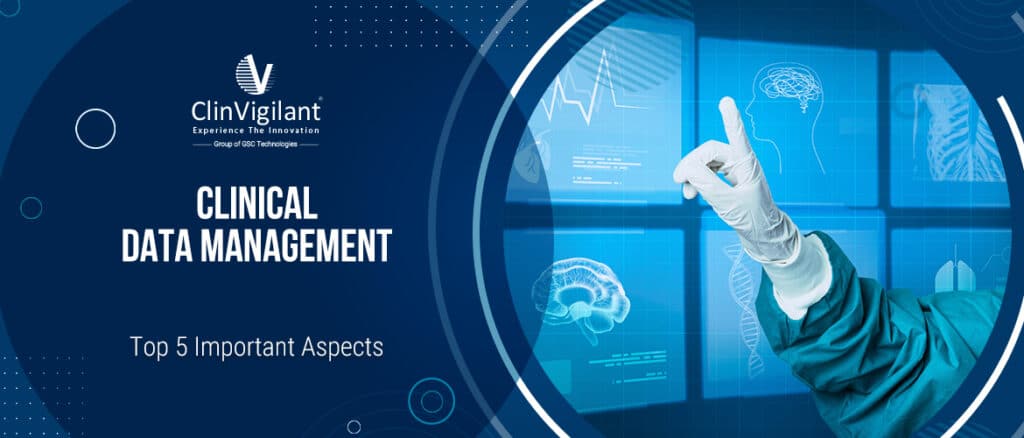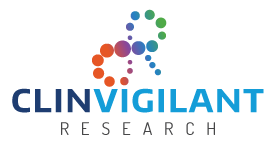Top 5 Aspects Of Clinical Data Management
Clinical data management is a critical process in clinical research that involves the collection, storage, processing, and analysis of subject data from clinical trials. Proper data management ensures the availability of high-quality, reliable data that can lead to actionable insights. This article will discuss the top 5 key aspects of effective clinical data management & electronic data capture for clinical trials.

Clinical Data Management
Clinical Research management software encompasses the entire lifecycle of subject data from clinical trials – from initial collection and validation to standardized coding, cleaning, locking, and transfer for statistical analysis. It aims to deliver timely, accurate, and consistent data while ensuring regulatory compliance.
Importance of Clinical Data Management
High-quality data is the foundation of robust evidence from clinical trials. Flawed data collection and management can compromise trial results and eventually affect patient safety and health decisions. Effective data management & EDC in Clinical Research enhances data quality, oversight, and standards.
Team members and their roles in clinical trial data handling
Effective data management requires the following people to operate each function methodically.
- Clinical Data Associate
- Quality Assurance Associate
- Developer/Programmer (Database)
- Data Manager
- Medical Coding Associate
Overview of the Top 5 Aspects to be Discussed
This article will cover data collection, standardization, security, cleaning, and database design as the top 5 critical aspects of clinical data management.
Data Collection and Capture
The first step in clinical trial management system involves the collection and capture of subject data in a reliable manner.
- Importance of Accurate Data Collection The famous slogan “garbage in, garbage out” applies perfectly to clinical trials. Faulty data collection leads to flawed data that compromises trial integrity. Accuracy and completeness are essential.
- Paper-based vs Electronic Data Capture Electronic data capture (EDC) via online forms provides instant validation checks and is becoming more popular than traditional paper-based data collection. However, paper case report forms are still used when technology is limited.
- Data Source Identification Data must be traceable back to its original raw source (e.g. lab report, questionnaire, diary, etc.) for source data verification. Unique identifiers are assigned to subjects and data points.
- Case Report Form (CRF) Design CRFs are the data collection forms used to gather subject data in a structured format. Intuitive design and layout per the study protocol are crucial for accurate data capture by site personnel.
- Data Validation and Quality Control Real-time validation via EDC improves data quality. Checks for discrepancies, questionable values, and incomplete data are incorporated to flag issues for early resolution.
Data Standardization and Coding
Standardization of clinical trial data enables unified interpretation and analysis across sites, studies, and systems.
- Role of Data Standards in Clinical Research Standardized terminologies, semantics, and transmission protocols allow integration of data from various sources and systems involved in a trial.
- Standardized Vocabularies and Dictionaries Controlled terminologies like MedDRA and WHO-ART are used globally to standardize adverse event terms and medical conditions captured in CRFs.
- Importance of Medical Coding Medical coding via classifications like ICD-10 and SNOMED provides standardized representations of medical data collected during trials.
- Data Mapping and Transformation Data mapping ensures clear translation across different terminology standards between sources and receiving databases.
- Ensuring Data Consistency Standards combined with data coding, cross-referencing, and mapping drive consistency in data collection and representation.
Data Security and Privacy
Protecting the security and privacy of clinical trial subjects’ personal data is a fundamental ethical and regulatory mandate.
- Patient Privacy and Regulatory Compliance Local data privacy laws like HIPAA and global regulations like GDPR require clinical data systems to implement safety measures protecting patient data confidentiality.
- Data Encryption and Access Control Encryption of data transmissions and storage combined with role-based access and multi-factor authentication safeguards data security.
- Protecting Personally Identifiable Information (PII) Steps like de-identification and maintaining separate databases for PII from trial data protect subject privacy and minimize security risks.
- Regulatory Guidelines Extensive guidelines around security controls, audits, and breach notification exist, such as HIPAA Security Rule and GDPR Article 32 on security.
- Auditing and Monitoring Mechanisms for access logging, cybersecurity drills, and data use monitoring maintain continued vigilance and readiness.
Data Cleaning and Transformation
Meticulous data cleaning and transformation ensures only the highest quality data is used for clinical trial analysis and insights.
- Data Cleaning Process- The iterative process of identifying, diagnosing, and correcting corrupt or inaccurate data from various errors, outliers, and discrepancies.
- Handling Missing Data Strategies like imputation, interpolation, likelihood-based methods, or simply excluding missing data points are employed based on analysis requirements.
- Outlier Detection and Management- Outliers – data points with extreme values – are assessed for their cause and dealt with by exclusion or correction of erroneous values.
- Data Transformation for Analysis Data formats are transformed as needed for downstream analysis – like categorical encoding of text variables for machine learning algorithms.
- Data Quality Assurance Multiple QA checks at every step ensure standards compliance, completeness, accuracy, and reliability of data for analysis.
Database Design and Management
Thoughtful clinical data management system and database design establishes a robust data storage and access infrastructure.
- Choosing the Right Database System Relational databases like Oracle or SQL server provide ACID-compliant storage of structured clinical data with referential integrity.
- Data Storage and Retrieval Secure data storage in encrypted databases enables easy retrieval for analysis while protecting subject privacy.
- Data Backup and Recovery Backup policies, redundant storage, rapid restores, and disaster recovery protocols protect against data loss from system failures.
- Version Control Database versioning tracks data changes over time while retaining previous versions for comparison and rollbacks if needed.
- Database Validation and Maintenance Validation and maintenance activities like migrations, performance tuning, patches, and testing uphold database stability and performance.
Conclusion
Effective management of clinical trial management system data requires expertise across data collection, cleaning, coding, standards, security, storage, and analytics – involving both cutting edge technology as well as intricate human oversight. With data integrity becoming the central focus of quality and compliance in clinical research, purposeful design and continuous improvement of data management systems are imperative to delivering the promise of life-changing therapies to patients worldwide.
There are certainly challenges ahead as data volume and complexity grow exponentially. However, the future looks bright with newer innovations in cloud computing, machine learning, blockchain, AI, and automation on the horizon to help tame the data deluge. Though technology will augment human effort, it is ultimately the synergy between human intelligence and machines that will propel clinical data management capabilities to the next level.
Do you have any questions regarding clinical data management? & How ClinVigilant can help-
ClinVigilant is a leading technology-driven clinical research solutions company that aims to accelerate and optimize clinical trials globally.
Some key aspects:
- Provides end-to-end clinical trial solutions including electronic data capture systems, clinical trial management software, consulting, and other digital solutions
- Services include database building, data management, pharmacovigilance, biostatistics, and medical writing
- Operates globally including markets like the US, Europe, Asia-Pacific
- Adopts latest technologies like AI, blockchain, advanced analytics to improve quality and efficiency
- Modular solutions that can be customized to client needs
- Web and mobile apps for easy access to clinical trial data and processes
- Electronic source data capture from sites to reduce errors and costs
- Real-time visibility into trial status through centralized dashboards
ClinVigilant’s technology-driven solutions help optimize costs, timelines, and quality in clinical trials through improved efficiency, transparency, and collaboration.
Do you have any questions regarding clinical data management?
Or do you need any support in data management for your clinical trials? Clinivgilant has expertise in providing digital solutions for your clinical trials. Provide the details below to connect with us and explore our services.

